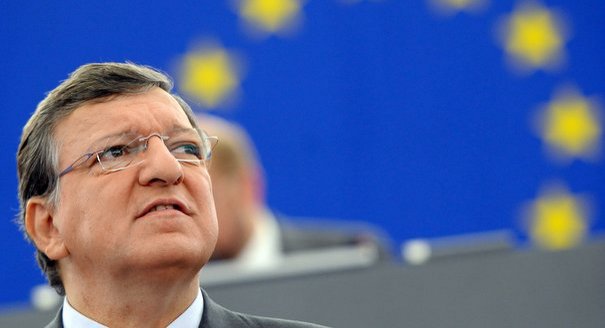The ghost of political union is haunting Europe. European Commission President Barroso’s State of the Union address last week signaled a new direction in the debate on the future of Europe. He called for a “decisive deal” to complete the economic and monetary union with a political union. Similarly, Chancellor Merkel has spoken openly about the prospect of a political Europe, and this week a group of eleven European Union foreign ministers delivered an important report on how to overcome the crisis by deepening European integration.
There is a growing consensus that a political union will be the critical condition determining whether Europeans matter together, or falter separately in the world. This message is not new, but the context is. A new phase of euro crisis management may be starting, with the emphasis moving from countering asymmetric market threats to building political stability and growth. The European mood seems to be shifting from consternation and estrangement to responsibility and even resolve. Fear may focus minds, but ambition lifts spirits.
To be sure, no Rubicon of political union is yet in sight and the path to such a momentous leap is littered with landmines: bond spreads, court rulings, elections, and possibly referenda. But the conditions for containing and overcoming the crisis are progressively falling into place. There is growing awareness of what this crisis is about. The—sizeable—tip of the crisis may be financial and economic but the bulk of it is political. It is in fact a profound crisis of sovereignty. EU member states cannot individually provide for their prosperity and security but the Union is not yet fully empowered to act where necessary. The crisis of confidence in the euro, and the Union, stems from the gulf between waning national sovereignty and unfulfilled European integration, and whether that gap is widening or narrowing.
Despite countless predictions to the contrary, important policy steps have been sending one consistent message: the gap is narrowing. The six-pack legislation, the painful structural reforms undertaken by many EU countries, the fiscal compact, the European Stability Mechanism (ESM) and the green light it received from the German Constitutional Court, substantial aid to Spanish banks, the mobilization of funds and project-bonds for growth, the European Central Bank decision to purchase (under tight conditions) short-term government bonds, and ongoing work on the banking union all matter in their own right. But their meaning lies in their cumulative effect. Taken one by one, many of these measures have come too late and delivered too little. However, looking at them as a package, they begin to acquire critical mass and signal a pattern.
The political sustainability of this pattern will be the ultimate test of Europe’s ability to survive the crisis. For all their significance, policy fixes alone cannot resolve a political problem. This is why the question of political union cannot be dodged for much longer. And this is where doom and gloom has so far prevailed. As conventional wisdom goes, most Europeans are fed up with a union they feel is too remote. They do not trust its institutions, do not trust each other, and are tempted to go it alone. There are some grounds and polling evidence for this assessment but doom-and-gloomers are missing the point.
Recent elections, from France to the Netherlands, have seen much debate, even controversy, about the EU—but not a defeat for Europe. True, populism has risen, but it has been contained. Arguably, people are expressing discontent more than an outright rejection of the EU. Most Europeans do not want to backtrack from European integration, but they are strongly demanding an explanation for European policies: What is more austerity for? What is more solidarity for? They may not oppose more pooling of sovereignty in principle, but they do ask what the purpose is. The times of blank-cheque consent to an ever closer union are over. But an untapped pool of legitimacy and support for the European project remains out there. Furthermore, giving purpose to the project is no longer principally a top-down exercise, but a bottom-up process.
President Barroso was right to focus on the need for a European public space as a key enabler of political union. There are many national debates on Europe, but little European debate. This debate should not be about persuading citizens that Europe is a good thing, but confronting different political visions and exposing the common ground that defines Europeans as a community. There is no union without a community. The challenge of political union is to define new “contracts” between Europeans on what they share and what they want to achieve together. The old community method needs to be matched with new initiatives to build a political community.
National debates need views from beyond their respective countries. National parliaments should hold their own annual state of the union debates, measures should be taken to expand pan-European media platforms, and political parties should regularly involve politicians from their European political families in national debates. A political convention should precede any significant new stage of treaty change, embedding inter-governmental negotiations in trans-national political deliberation. In contrast to the 2002 Convention on the Future of Europe, such a convention should gather stakeholders not only from politics, but also economic and social actors from across the Union to help pave the way to the “contracts” that would frame new institutional arrangements.
Giovanni Grevi is acting director of FRIDE.






